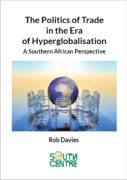Southern African Development Community (SADC)
Policy Paper on National Strategies for South-South and Triangular Cooperation
For developing countries to realize the full potential of South-South and Triangular Cooperation (SSTrC) for achieving their national sustainable development objectives, it is important to formulate national SSTrC strategies as part of their national SSTrC ecosystems. Such national strategies would serve as guidance for a country’s SSTrC activities, initiatives and institutional framework, both as provider and beneficiary of SSTrC. This policy brief highlights the importance of developing national SSTrC strategies for achieving national development objectives and lays out the main elements that can be taken into consideration by developing countries for designing their national SSTrC strategies. While many developing countries do not have an explicit SSTrC strategy in place yet, the state of play shows that its elements can be found in various policies, institutional guidance and national development strategies. The absence of a holistic approach and a nationally acknowledged strategy carries the risk of fragmentation and incoherence in undertaking SSTrC activities. The potential of national SSTrC strategies for enabling effective responses to crises (such as COVID-19) is also explored.
This paper was developed jointly by the Islamic Development Bank (IsDB) and the South Centre based on the concept of the Islamic Development Bank on National Ecosystems for South-South and Triangular Cooperation.
(more…)
Eighteen Years After Doha: An Analysis of the Use of Public Health TRIPS Flexibilities in Africa
By Yousuf A Vawda and Bonginkosi Shozi
As we observe the 18th anniversary of the Doha Declaration on the TRIPS Agreement (Agreement on Trade-Related Aspects of Intellectual Property Rights) and Public Health, it is appropriate to take stock of intellectual property developments and endeavour to present a comprehensive account of the situation in the African continent in respect of the implementation of TRIPS flexibilities, specifically those regarding access to medicines. This research paper provides an overview of the extent to which selected African countries have adopted legal and policy frameworks with regard to TRIPS flexibilities, examines the actual use of these flexibilities in enabling access to medicines in those countries, and suggests some recommendations for optimising the use of the flexibilities in pursuing public health imperatives.
(more…)
The Politics of Trade in the Era of Hyperglobalisation: A Southern African Perspective
 About the Book:
About the Book:
Matters of international trade are increasingly widely recognised as major shapers of global politics. News bulletins are giving more and more coverage to matters like the so-called “trade wars” between the United States and China. These are, indeed, increasingly defining relations between the two largest economies in the world and could well underpin a multi-dimensional rivalry that could be a central feature of international relations for many years to come. Brexit is dominating and indeed re-shaping politics in the United Kingdom. By definition a rejection of a regional integration arrangement, Brexit has also revealed under-currents profoundly shaped by the outcome of a broader trade-driven process called “globalisation”. Just as regional integration is weakening in Europe, African countries have taken decisions that could lead to the most profound and ambitious step forward in African regional integration – the establishment of an African Continental Free Trade Area (AfCFTA). This study seeks to present an analysis of the political economy of trade negotiations over the past quarter century on two main fronts: the multi-lateral and those pertaining to regional integration on the African continent.
Author: Rob Davies is former South African Minister of Trade and Industry.
(more…)
The Future of Investor-State Dispute Settlement Deliberated at UNCITRAL: Unveiling a Dichotomy between Reforming and Consolidating the Current Regime
By Kinda Mohamadieh
Reform of investor-state dispute settlement (ISDS) is being deliberated at the United Nations Commission on International Trade Law (UNCITRAL) Working Group III, which will be meeting in New York between the 1st and 5th of April 2019. For several years, the ISDS regime has been under scrutiny from voices in both developed and developing countries. ISDS reforms have been addressed in multiple forums, including national, bilateral, regional and multilateral levels, such as the United Nations Conference on Trade and Development (UNCTAD). Reforms could include moving away from arbitration as the norm for dispute settlement between foreign investors and host states or end up by introducing adaptations that might make arbitration in ISDS cases perform in a more acceptable way. Finding one-size-fits-all solutions in these deliberations is unlikely. Advancing relevant reforms would require full and effective participation of interested countries, equal opportunity for different points of views to be heard and integrated into the design of any potential outcome, and effective mechanisms to address any potential conflicts of interest within this forum.
(more…)













 About the Book:
About the Book: